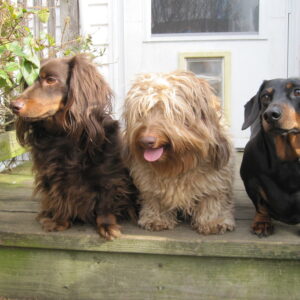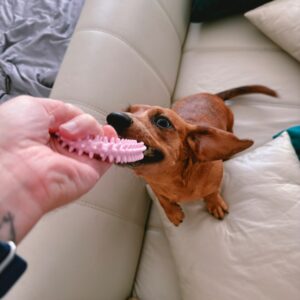Dachshund weight control is an essential aspect of ensuring the health and longevity of your beloved pet. Like all dog breeds, dachshunds can struggle with weight issues, which can lead to various health problems if not managed properly. Understanding the nuances of weight management for your dachshund is crucial for their overall well-being. In this article, we will explore important aspects such as understanding dachshund weight management, the best practices for controlling their weight, and the role of diet and exercise in maintaining a healthy lifestyle. Additionally, we will address common pitfalls to avoid, provide tips for recognizing signs of obesity, and discuss how to set realistic weight goals for your furry friend. By following the guidelines outlined here, you will be well-equipped to help your dachshund achieve and maintain a healthy weight.

Understanding Dachshund Weight Management
Managing your Dachshund’s weight is crucial for their overall health and well-being. Dachshunds are prone to obesity, which can lead to serious health issues. Understanding the factors that contribute to weight gain and loss is essential for every owner.
First, it’s important to recognize that weight management involves a combination of diet, exercise, and regular veterinary check-ups. Each Dachshund is unique, and their weight management plan should be tailored to their specific needs.
Factors Influencing Weight
- Age: As Dachshunds age, their metabolism slows down, making weight management more challenging.
- Activity Level: More active dogs tend to maintain a healthier weight.
- Genetics: Some Dachshunds may have a genetic predisposition to gain weight.
- Diet: The type and amount of food consumed play a significant role in weight control.
To effectively manage your Dachshund’s weight, consider implementing a structured feeding schedule. This can help prevent overeating and promote a healthy relationship with food.
Additionally, monitoring your dog’s body condition score (BCS) can provide valuable insights into their weight status. A healthy Dachshund should have a defined waist and ribs that are easily felt but not visible.
Remember, weight management is a lifelong commitment. Regularly reassess your Dachshund’s weight and adjust their diet and exercise routines as needed. With the right approach, you can help your furry friend live a long, healthy life.

Best Practices for Controlling Your Dachshund’s Weight
Controlling your Dachshund’s weight is essential for their overall health and well-being. Here are some best practices to help you manage your furry friend’s weight effectively:
- Regular Weigh-Ins: Schedule regular weigh-ins to monitor your Dachshund’s weight. This will help you identify any changes early on.
- Portion Control: Measure your dog’s food portions according to their specific needs. Avoid free-feeding to prevent overeating.
- Quality of Food: Choose high-quality dog food that is appropriate for your Dachshund’s age and activity level. Look for options that are lower in calories but still nutritious.
- Consistent Feeding Schedule: Establish a consistent feeding schedule. Feeding at the same times each day can help regulate your dog’s metabolism.
- Healthy Treats: Opt for healthy treats, and limit the number of treats given throughout the day. Consider using fruits and vegetables as low-calorie options.
- Incorporate Activity: Make sure to include regular physical activity in your Dachshund’s routine. Aim for at least 30 minutes of exercise each day.
- Monitor Body Condition: Regularly assess your Dachshund’s body condition. You should be able to feel their ribs without excess fat covering.
- Stay Educated: Keep yourself informed about best practices in pet nutrition and weight management. Knowledge is key to making the right decisions for your dog.
By following these best practices, you can help ensure that your Dachshund maintains a healthy weight and enjoys a happy, active life.

Common Pitfalls in Dachshund Weight Control
When managing your Dachshund’s weight, there are several common pitfalls that pet owners may encounter. Being aware of these can help ensure a healthy lifestyle for your furry friend.
- Inconsistent Feeding Schedule: Not sticking to a regular feeding schedule can lead to overfeeding or underfeeding. Establish a consistent time for meals to help regulate your Dachshund’s appetite.
- Free Feeding: Leaving food out all day encourages snacking and can lead to weight gain. Instead, measure portions and provide set meal times.
- Ignoring Treats: Treats can add up quickly in calories. Be mindful of the quantity and quality of treats you give, opting for healthier options when possible.
- Insufficient Exercise: Many owners underestimate the amount of exercise their Dachshund needs. Regular physical activity is essential for maintaining a healthy weight.
- Overlooking Weight Changes: Failing to regularly weigh your Dachshund can lead to unnoticed weight gain. Regular weigh-ins can help you catch issues early.
- Relying on Human Food: Feeding your Dachshund table scraps can lead to unhealthy weight gain. Stick to dog-specific foods and treats.
- Neglecting Portion Control: Not measuring food portions can result in overfeeding. Always follow the recommended serving sizes based on your Dachshund’s weight and activity level.
- Emotional Feeding: Feeding your Dachshund out of boredom or stress can create unhealthy habits. Instead, find other ways to engage and comfort your pet.
By being aware of these common pitfalls, you can better manage your Dachshund’s weight and promote a healthier lifestyle.

The Role of Diet in Dachshund Weight Loss
When it comes to helping your Dachshund lose weight, diet plays a crucial role. A well-balanced diet can significantly impact your dog’s overall health and weight management. Here are some important aspects to consider:
- Quality of Food: Choose high-quality dog food that is specifically formulated for weight management. Look for options that are low in calories but high in nutrients.
- Portion Control: Measure your Dachshund’s food portions carefully. Use a measuring cup to avoid overfeeding and stick to the recommended serving sizes.
- Frequent, Smaller Meals: Instead of one or two large meals, consider feeding your Dachshund smaller meals throughout the day. This can help maintain energy levels and prevent hunger.
- Incorporate Vegetables: Adding safe vegetables like carrots, green beans, and peas can increase fiber intake without adding too many calories. This helps your dog feel full.
- Avoid Table Scraps: Resist the temptation to give your Dachshund table scraps, as these can be high in calories and unhealthy for them.
- Monitor Treats: If you give treats, opt for low-calorie options and limit the quantity. Treats should only make up a small portion of their daily caloric intake.
By focusing on a nutritious diet and being mindful of portion sizes, you can help your Dachshund achieve and maintain a healthy weight. Always remember to consult with your veterinarian when making significant changes to your dog’s diet.

Exercise Tips for Keeping Your Dachshund Healthy
Keeping your dachshund active is essential for their overall health and well-being. Here are some effective exercise tips to ensure your furry friend stays fit and happy:
- Daily Walks: Take your dachshund on short, daily walks. Aim for at least 30 minutes each day to help maintain their weight and strengthen their muscles.
- Playtime: Engage in fun play sessions with toys. Fetch or tug-of-war can be great ways to get them moving.
- Swimming: If your dachshund enjoys water, swimming is an excellent low-impact exercise. It’s easy on their joints and helps build strength.
- Obstacle Courses: Set up a small obstacle course in your yard or home. Use items like cones or tunnels to encourage your dachshund to jump and navigate.
- Socialization: Arrange playdates with other dogs. Social interaction can motivate your dachshund to be more active.
- Interactive Toys: Invest in interactive toys that require your dachshund to move and think. These can keep them mentally and physically stimulated.
Always monitor your dachshund during exercise to ensure they don’t overdo it. If they show signs of fatigue, take a break. Regular exercise is key to a long and healthy life for your dachshund!

Signs of Obesity in Dachshunds to Watch For
Recognizing the signs of obesity in your Dachshund is crucial for their health and well-being. Here are some key indicators to keep an eye on:
- Excess Weight: If your Dachshund is significantly heavier than the breed standard, it may be a sign of obesity.
- Difficulty Breathing: Obese Dachshunds often have trouble breathing, especially during exercise or play.
- Reduced Energy Levels: If your dog seems less active or less interested in play, it could be due to excess weight.
- Visible Fat Pads: Look for fat deposits around the abdomen, hips, and neck. These are signs of obesity.
- Difficulty Moving: If your Dachshund struggles to jump or climb stairs, it may be due to weight issues.
- Changes in Appetite: An increase in appetite, despite limited activity, can indicate obesity.
- Skin Problems: Obesity can lead to skin issues, including infections and irritations due to skin folds.
It’s important to monitor these signs regularly. If you notice any of these symptoms, consider consulting your veterinarian for advice on managing your Dachshund’s weight.

How to Set Realistic Weight Goals for Your Dachshund
Setting realistic weight goals for your Dachshund is essential for their overall health and well-being. Here are some key points to consider:
- Assess Current Weight: Start by determining your dog’s current weight. Use a scale or consult your vet to get an accurate measurement.
- Understand Breed Standards: Familiarize yourself with the ideal weight range for Dachshunds. This can vary based on their age and size.
- Set Achievable Targets: Aim for gradual weight loss. A safe goal is about 1-2% of body weight per week.
- Incorporate a Balanced Diet: Ensure your Dachshund’s diet is nutritious and appropriate for their weight loss journey. Consult your vet for specific recommendations.
- Monitor Progress: Regularly track your dog’s weight and adjust goals as necessary. Celebrate small victories to keep motivated.
- Be Patient: Weight loss takes time. Avoid rushing the process, as it can lead to health issues.
By following these guidelines, you can set realistic weight goals that will help your Dachshund lead a healthier life.

Consulting a Vet for Your Dachshund’s Weight Needs
When it comes to managing your Dachshund’s weight, consulting a veterinarian is crucial. They can provide expert advice tailored to your dog’s specific needs. Here are some key reasons why you should seek professional guidance:
- Personalized Assessment: A vet can evaluate your Dachshund’s current weight and overall health, helping you understand what a healthy weight range should be.
- Health Concerns: Excess weight can lead to various health issues. Your vet can identify any potential problems and recommend solutions.
- Dietary Recommendations: A veterinarian can suggest the best diet plan for your Dachshund, ensuring they receive the right nutrients while managing their weight.
- Exercise Plans: Your vet can create a tailored exercise program that suits your Dachshund’s age, health status, and weight goals.
- Regular Monitoring: Frequent check-ups allow your vet to track your dog’s progress and make necessary adjustments to their weight management plan.
In summary, consulting a vet is essential for effectively managing your Dachshund’s weight. Their expertise ensures that your furry friend stays healthy and happy throughout their weight loss journey.

Homemade Treats for Weight-Conscious Dachshunds
Creating homemade treats for your dachshund can be a fun and healthy way to show your love while keeping their weight in check. Here are some simple and nutritious recipes that are perfect for your weight-conscious pup:
1. Pumpkin and Oatmeal Biscuits
This recipe is low in calories and high in fiber, making it a great option for your dachshund.
- Ingredients:
- 1 cup of canned pumpkin
- 2 cups of whole wheat flour
- 1 cup of rolled oats
- 1 egg
- Optional: A pinch of cinnamon
Instructions:
- Preheat your oven to 350°F (175°C).
- In a bowl, mix all the ingredients until a dough forms.
- Roll out the dough and cut it into shapes.
- Place the biscuits on a baking sheet and bake for 25-30 minutes.
2. Sweet Potato Chews
These chews are not only tasty but also packed with vitamins.
- Ingredients:
- 1 large sweet potato
Instructions:
- Preheat your oven to 250°F (120°C).
- Slice the sweet potato into thin strips.
- Place them on a baking sheet and bake for 2-3 hours until they are dried and chewy.
3. Chicken and Rice Balls
These protein-rich treats are perfect for rewarding your dachshund.
- Ingredients:
- 1 cup of cooked chicken, shredded
- 1/2 cup of brown rice, cooked
- 1/4 cup of peas
Instructions:
- Mix all ingredients in a bowl.
- Form small balls and place them on a baking sheet.
- Bake at 350°F (175°C) for 15 minutes.
Remember to store these treats in an airtight container to keep them fresh. Treats should be given in moderation, especially for weight-conscious dachshunds. Always consult your vet if you have any concerns about your dog’s diet.

Maintaining Weight After Reaching Your Dachshund’s Goal
Once your dachshund has achieved its ideal weight, the next challenge is to maintain that weight. This process requires diligence and consistency. Here are some tips to help you keep your dachshund at a healthy weight:
1. Regular Monitoring
Weigh your dachshund regularly to ensure it stays within a healthy range. Weekly or bi-weekly weigh-ins can help you catch any weight gain early. Use a scale that is easy to read and safe for your pet.
2. Consistent Feeding Schedule
Maintain a consistent feeding schedule to regulate your dachshund’s metabolism. Feed them at the same times each day and avoid free-feeding, which can lead to overeating.
3. Portion Control
Measure your dachshund’s food portions according to your vet’s recommendations. Using a measuring cup can help prevent overfeeding and keep their calorie intake in check.
4. Healthy Treats
- Opt for low-calorie treats and limit the quantity.
- Consider using fruits and vegetables as healthy alternatives.
- Be mindful of the total caloric intake from treats.
5. Regular Exercise
Keep your dachshund active with daily exercise. Regular walks, playtime, and engaging activities can help maintain their weight. Aim for at least 30 minutes of exercise each day.
6. Adjusting Diet as Needed
As your dachshund ages or if its activity level changes, you may need to adjust its diet. Consult with your vet to discuss any necessary changes to keep your pet healthy.
7. Watch for Weight Fluctuations
Be vigilant about any sudden weight changes. If your dachshund starts to gain weight, reassess its diet and exercise routine. Early intervention can prevent further weight gain.
8. Stay Educated
Keep yourself informed about best practices in pet nutrition and weight management. Resources such as books, articles, and vet consultations can provide valuable insights.
By following these guidelines, you can help your dachshund maintain its healthy weight and enjoy a long, happy life.




